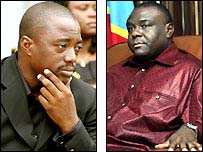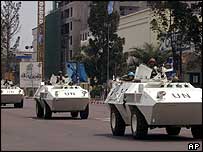|
By Joseph Winter
BBC News
|


Joseph Kabila faces a run-off with Jean-Pierre Bemba (right)
|
The election run-off in the Democratic Republic of Congo is supposed to end a period stretching back some 130 years, marked by a succession of brutal and astonishingly corrupt regimes.
While DR Congo has been a "black hole at the heart of Africa", as a diplomat once described it, other countries have been sucked into conflict and it has been impossible to forge strong economic links between southern and eastern Africa and the north and west.
One plan is to use the flow of the River Congo to supply electricity across the continent, but for that peace and good management are needed.
This is why DR Congo now hosts the world's largest peacekeeping force - some 17,000 soldiers - with an annual budget of $1bn.
The United Nations hopes that turning round DR Congo will go on to provide a massive boost to other poor African countries.
At present this country which is two-thirds the size of Western Europe has just 300 miles of paved roads.
"We've suffered a lot, we want things to change," said Harriette Katuku Kishala, a nurse in DR Congo's second city, Lubumbashi.
Armed groups
However, not all the 56m Congolese are convinced that the elections will change much.
 |
DR CONGO RESULTS BY PROVINCE
NATIONALLY:
Joseph Kabila: 45%
Jean-Pierre Bemba: 20%
Antoine Gizenga: 13%
Nzanga Mobutu: 5%
Oscar Kashala: 4%
Turnout: 70%
Source: CEI
|
Erneste, a middle-aged businessman from the capital, Kinshasa, certainly does not have high hopes.
"I'm afraid. Whoever loses will resort to violence," he said.
Such fears are not without foundation after a five-year war, which officially ended in 2003. This is why some of those UN troops have been deployed to the east of the country, where armed groups still operate.
Under the deal which ended the conflict, the various warring factions joined a power-sharing government but they are now fiercely competing against each other in the elections.
This is progress but as Erneste says, it remains to be seen how the losers take defeat.
The announcement of the first round results sparked three days of clashes between security forces loyal to President Joseph Kabila and his rival Jean-Pierre Bemba.
Mr Bemba, a former rebel leader, still has his own personal protection force.
Mineral resources
Mr Bemba did well in western DR Congo, including the capital, Kinshasa, while President Kabila swept the board in the east, which has been a war zone for almost a decade.
People there have seen the brutalities of war at close hand and hail Mr Kabila for his efforts to end the fighting once and for all, while they blame Mr Bemba and other rebel groups for the conflict.
 |
 We need to learn how democracy works. Maybe our lives will start to improve after the next elections
We need to learn how democracy works. Maybe our lives will start to improve after the next elections

|
One reason why the fighting has mostly been in the east is because this is where DR Congo's immense mineral resources are located.
The country's boasts huge reserves of gold, some 30% of the world's diamond reserves, more than 70% of the valuable coltan mineral - a vital ingredient in mobile phones - and vast deposits of cobalt, copper and bauxite.
But these huge riches have only attracted a series of looters - from Belgium's King Leopold, who declared the country his personal possession at the end of the 19th century, to long-time leader, Mobutu Sese Seko, and then a host of militias and armies from up to nine other African countries during the recent war.
With the Congolese people choosing their leader for the first time since independence in 1960, the hope is that all these riches will from now on be used for their benefit.
But after such an abysmal record of government, whoever wins the elections will not be overburdened by high expectations.
"If the next president has $5m, he should keep $1m for himself, give $1m to his ministers and use $3m to build this country," Erneste told me.
"But why not use all the money for the country?" I asked innocently.
"No, we have to be realistic, that is never going to happen."

UN peacekeepers are being backed up by extra EU troops
|
And Erneste is right - that would indeed be a massive step forward from the days when the then Zaire was given huge amounts of foreign aid, in addition to its huge mineral wealth, and the only results were new mansions in Switzerland and on the French Riviera.
Mobutu reportedly did not believe in building roads or railways, in case such infrastructure was used by rebel soldiers to stage a coup.
This country, which is two-thirds the size of western Europe, is still only linked by air, as well as the river.
Arsene, a young Kinshasa hotel worker, is taking the long view: "I am looking forward to voting for the first time but I know it's the start of a long process," he said.
"We need to learn how democracy works. Maybe our lives will start to improve after the next elections."


